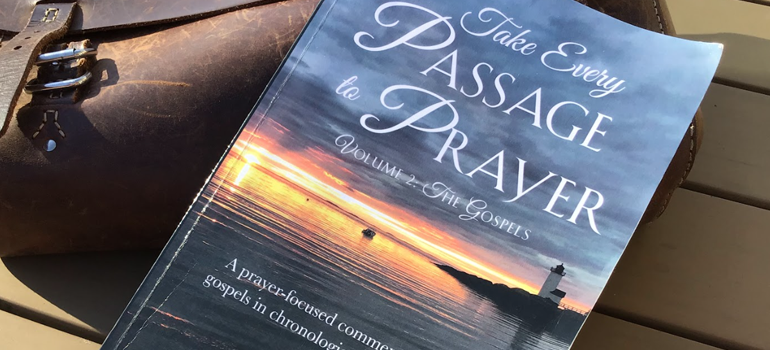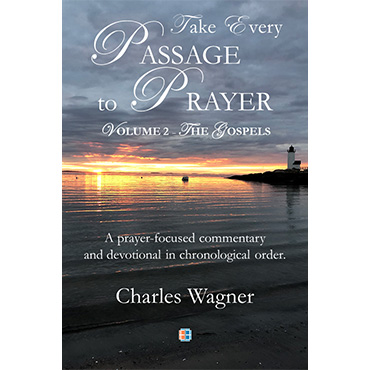The Gramazin Blog

01
Jul
The Sermon on the Mount: Notes
Take Every Passage to Prayer - Volume 2, The Gospels
Monday July 01, 2024
- When Jesus described those who are blessed, He knew He was describing Himself. Does anyone not believe that Jesus was the perfect representation of the Beatitudes?
- Jesus was being insulted, persecuted, and lied about, with all kinds of evil being said against Him, at the time He taught these truths. He knew what He was talking about.
- Salt was used as a food preservative and as a disinfectant. It is believed salt was even used by Roman soldiers as currency. The word “salt” came from Anglo-Norman French “salarie” which came from Latin “salarium” which came from Latin “sal” for salt. When Jesus said “you are the salt of the world, he was saying you have value.”
- People used olive oil in pottery lamps for the lighting in their home. The wealthier the family, the more decorative the lamps. Experiments of replicas of Herodian lamps have shown such lamps can burn 4 to 5 hours. Olive trees grew along the Mediterranean coast. The more oil a family had, the wealthier they were considered to me. Any metaphor Jesus used about a lamp would resonate with His audience.
- There was trash in the New Testament times as there is today. With houses tightly packed together and near the street, it is likely that a family’s trash might be “thrown out and trampled underfoot.”
- For what Jesus said to have full meaning, the Pharisees and teachers of the law must have had a reputation for righteous living that exceeded what most people could accomplish.
- “Raca” is the Aramaic word “????”. It meant “empty headed”, what we would say today as “stupid”, “clueless”, “idiot”, “airhead”, “knucklehead.” In other words, Jesus is saying if you question someone’s intelligence in a derogatory manner you have committed a sin worth burning in hell for. Perhaps we shouldn’t call people “stupid” anymore, not if we want to please Him.
- The gift at the altar was exactly that – a “gift”. It was not a required sacrifice for sin. God wants the gift but not until the man has made peace with the person he is in conflict with.
- The judges of the day were the Great Sanhedrin and the Lesser Sanhedrin.
- Unlike today’s prisons, where prisoners are locked in cells, prisoners of the day were chained to walls and, as with Paul, sometimes chained to Roman guards.
- The word “penny” was the Greek “?????????”. It represents about 3/8 of a cent. The word was also used for the description of the widow’s last coin in Mark 12:42.
- The Philistines gouged Samson’s eyes in Judges 16:21. The Babylonians also gouged the eyes of King Zedekiah in 2 Kings 25:7.
- Jesus’ teaching on divorce was most likely directed at the men since women didn’t have many rights to divorce. Jesus put restrictions on divorce because divorce was fairly easy to get in these times, though the contractual arrangements between the two families added legalities to complicate it.
- Verses that speak of heaven as God’s throne include 1 Kings 22:19, Psalm 11:4, Psalm 103:19, Isaiah 6:1, Isaiah 66:1, Daniel 7:9, Revelation 4:1-6, Revelation 20:11.
- Isaiah 66:1 also describes the earth as God’s footstool.
- The Code of Hammurabi and Babylonian law both called for an “eye for an eye”. The Old Testament calls for an “eye for an eye” in Exodus 21:24 and Deuteronomy 19:21.
- There were no automobiles in New Testament times. Travel was often by foot. There were bandits who took advantage of single travelers. Therefore, people often asked others to come with them on a trip. Hence, Jesus says if someone forces you to go one mile with them, go with them two miles.
- The Greek word for “pagan” is ???????. It means “Gentile”. Jesus is speaking to a Jewish audience who think they are superior to the Gentiles. Jesus is essentially saying “even the Gentiles do that” when referring to loving someone who loves you.
- There are 42 references to the word “perfect” in the NIV. God’s works, ways, knowledge, existence, law, faithfulness, and peace were all described as “perfect” in the Old Testament. We are to be perfect like God is perfect.
- Trumpets were made of ram’s horns. They were blown at special festivals and to herald the arrival of seasons. Apparently, those with access to the trumpets, who wanted attention, blew them to make everyone turn and see what they had to say.
- The cities in New Testament times had a relatively small footprint compared to cities we know today. The population had to live within the city walls or adjacent to them where they could flee if armies approached. As the populations grew, the limited space became more crowded with buildings and people. Therefore, when someone prayed on the street corner, it was meant to be seen by many people walking a few feet away.
- Bread was critical to the daily diet of people in the New Testament. It consisted of ground grain and a liquid, and it was kneaded and baked. Bread was usually eaten at home or carried when traveling between villages and cities. The typical family needed about three loaves of bread a day. Life without daily bread was unimaginable.
- Jesus personally experienced suffering when being led by the Holy Spirit into intense Satanic temptation. When He teaches us to pray that God does not lead us into temptation, He knows what He is talking about.
- Refer to “Jesus Calls Matthew, Interrogated About Fasting” for more detail about fasting.
- Moths are referred to in Job 13:28, Isaiah 50:9, James 5:2, and in the Sermon on the Mount. In each case, moths are considered destructive. The moths referred to in the Bible are believed to be Tinea who lay their eggs in woolen clothes. Given that people did not have large wardrobes, moths were a serious problem for people with only a few things to wear.
- The NIV uses the word “vermin” in Matthew 6:19. However, according to the Blue Letter Bible, the word is ?????? which means “rust”. Corrosive oxidation appears to be eating away at metals and, therefore, is considered vermin.
- Since Jesus said “where thieves break in”, burglary must have been a problem in that society, especially for the wealthier classes. In the absence of modern-day firearms, inexpensive locks, and alarm systems, the best burglary deterrent was to stay at home, to hire guards, or to be physically threatening to intruders. Therefore, Jesus’ reference to having to protect your things from thieves resonated with the crowd.
- It is estimated that nearly 50% of the population in New Testament times were slaves of some kind. Therefore, the other 50% would be masters. Once more, Jesus used wording that struck a chord with His audience.
- Jesus said that we cannot gain a single hour by worrying. How did they tell time without clocks and watches? We know that they did track the hours of the day. They tracked time during the day by the use of sundials and tracked time at night by the movement of stars. Jesus said in John 11:9, “are there not 12 hours of daylight? (NIV).” They allocated 12 hours from sunrise to sunset, even when the daylight shortened in winter. Therefore, an hour in mid-summer was longer than an hour in winter.
- Barns are referenced seven times in scripture: Psalm 144:13, Proverbs 3:10, Haggai 2:19, Matthew 3:12, Luke 3:17, Luke 12:18, and Luke 12:24. From these verses, we can determine that barns were used for storing grain/wheat, seed, and “every kind of provision.” People made business decisions to tear down barns and build bigger ones.
- Clothes were made from wool, linen, skins, and, for the wealthy people, silk. Both men and women wore underwear. Shawls were worn by men on top of cloaks, which was like a wrap. Women’s clothing was similar, though the items were usually longer, more decorative, and made of finer material.
- Jesus, the experienced carpenter, knew all about specks of sawdust in the eye. He no doubt reflected on stories from His carpentry background when He talked about planks and specks of sawdust.
- Wild dogs and wolves were a serious problems for the people of Palestine. We gather from Habakkuk 1:8 that wolves were especially fierce at dusk. Acts 20:9 tells us that shepherds had to continuously fight off wolves, no doubt with the rod mentioned in Psalm 23. Wolves were known to come into cities as well as terrify travelers in rural areas.
- How else do you get someone’s attention in this society without telephones and emails? You knocked on their door.
- The crowds listening to Jesus most likely were fishermen or knew fishermen given the proximity of both the Mediterranean Sea and the Sea of Galilee. Fish were readily available for consumption, though they had to be eaten within hours of having been caught without the availability of refrigeration.
- There are 42 species of snakes in the Palestine region. These snakes are nocturnal, avoiding the heat of the day. Nine of these species are venomous and seven of those are found in the wilderness in the south (see Deuteronomy 8:15). The most feared snakes are the vipers (Proverbs 23:32). The cobra is mentioned in Psalm 58:4. Numbers 21 speaks of the Lord sending venomous snakes among the people. Snakes were believed to be hidden in walls (Ecclesiastes 10:11).
- The people of the region were familiar with gates in city walls. Some of the gates were wide enough for carts with goods and materials. Other gates were narrow, allowing only a single person to pass through it. It was at the wide gates where the leaders of the community gathered to talk and interact with those entering in and leaving the city.
- There are 10 references to thornbushes in the Bible. Thornbushes are asked by trees to be king, are burned, are rested upon by flies, are in the hand of a drunkard, do not bear grapes or figs, and are replaced by juniper trees. The berries are poisonous to humans but are edible for birds.
- There are 6 references to thistles in the Bible. Thorns and thistles were mentioned in Genesis 3 as part of the curse on mankind’s sin. In 2 Kings, a thistle in Lebanon sent a message to a cedar tree. Hosea says that thistles will cover the altars. Hebrews says that lands producing thorns and thistles are worthless.
- Fig trees were prominent throughout Palestine. Figs are an important source of food for many animal species. If you had your own fig tree, you were considered wealthy. Adam and Eve hid their nakedness with the leaves of a fig tree. Jesus will one day curse a fig tree for bearing no fruit.
- The Sea of Galilee is about 13 miles long and 7 miles wide, totaling 64 square miles. The Jordan River is the main source of water. The sea is known for bad weather. Storms can develop suddenly when cool air from the nearby mountains collide with the warm air near the water. East winds also bring hot air from the desert and rush down the mountains. Waves of 10’ or more have been encountered by fishermen and have hit towns on the shore. It is best to have your house built on rocks.
Amen.







